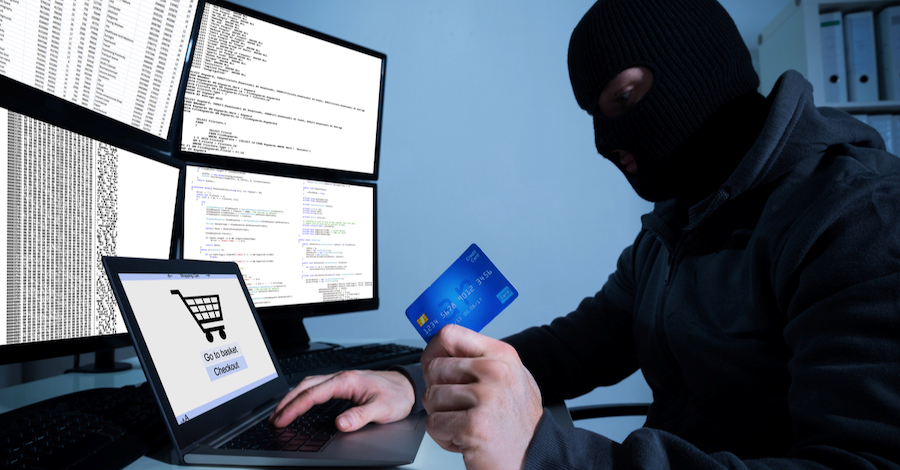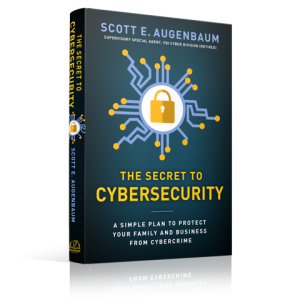R U Ready for CyberCriminal Tuesday? The day after CyberMonday!

The following article was written by Scott Augenbaum who is our keynote speaker at RetailROI SuperSaturday. Scott is a Retired FBI Supervisory Special Agent of Cyber Division and Author.
To learn more about SuperSaturday, go here.
Twelve Tips to Avoiding Cyber Crime this Holiday Season
by Scott Augenbaum
Hope you and your family had a wonderful Thanksgiving. I refer to the Tuesday after CyberMonday as CyberCriminal Tuesday. The following are a number of tips to help you staff safe this holiday season. I am so grateful that after my career with the FBI I can do what I love to do which is preventing CyberCrime victimization. Feel free to share this with your family, staff and clients.
I joined the New York Field Office of the Federal Bureau of Investigation (“FBI”) in 1988 as a support employee. In 1994, I became a Special Agent where my focus was on domestic terrorism, white-collar and hate crimes as well in computer crime investigations. From 2003 to 2018 I was assigned to handle complex CyberCrime investigations in Washington D.C and Nashville, TN.
During my decades I interacted with over one thousand victims of cybercrime, each of which affected me personally, and learned that one of the most common elements about Cyber Crime was that many good, smart people became unwitting victims.
Since retiring from the FBI in early 2018, I offer Cyber protection strategies to individuals, groups and businesses through my book and at meetings. By sharing my life’s journey in the Cyber Crime Field, I want everyone to acknowledge that there is a problem and I try to make it simple by breaking things down to what I call the “Four Truths About Cyber Security.”
Truth One – Nobody expects to be a victim.
Truth Two – Once the Cyber Criminals steal your money, the chances of a full recovery are slim to none. If the money is out of your bank account or already converted into gift cards, neither the bank nor the credit card company are responsible for helping get the money back.
Truth Three – The chances of law enforcement bringing Cyber Criminals to justice is challenging at best. Even with digital clues, such as emails, social media accounts and 1-800 numbers, tracing the crime back to the actual perpetrator is practically impossible. And if you think that following the money trail is a viable strategy for recovery, more times than not you are led to foreign bank accounts that are subject to rules, regulations and treaties that can result in it taking years to access bank records. By that time, the criminals will be long gone.
Truth Four – Most Cyber Crime incidents could have been prevented without spending money on products, services or even needing a technical background. All that is needed is empowering the end user with a couple of key pieces of information and no-cost preventive action plans.
In 2020, 175 million Americans shopped online between Black Friday and Cyber Monday. It is conservatively estimated that 90% of shoppers will engage in online in 2021 resulting in purchases exceeding $910 billion in value. Cyber Criminals always step up their game during the holiday season as they realize most American’s will be shopping online.
My goal is to help you reduce your chances of becoming the next Cyber Crime victim without having to purchase products, services or being technical.If some or all of the following tips were implemented, Cyber Crime would rapidly decline.
- As sure at the driven snow is white, the day after Cyber Monday you will get an email, text message or telephone call from someone purporting to be from your bank, credit card, Amazon, BestBuy, Walmart or Costco customer service rep or from UPS, FedEx or the Post Office claiming there was an issue with your purchase or that your package was delayed in shipping. This is a Cyber Criminal knocking on your door. The Cyber Criminal is trying to trick you into clicking on a link that will result in their having access to and stealing your username and password. You have given them the key to your account and personal information that you probably use elsewhere.
- Think before you click.Think before you act. Become a human firewall. Take the time to log into your account through your phone app or go to the website. Never call the telephone number in the email as you might be calling the Cyber Criminal.
- Keep your passwords secure. Remember, the Cyber Criminal’s greatest chance for success is when they know your username and password. Just think of the havoc they can cause if they steal your account log-in credentials.
- Do not be one of the 66% of the population who uses the same username and password for multiple accounts. If the Cyber Criminal steals your password from one online retailer, there is a good chance your other accounts will be compromised.
- NEVER use a debit card for online shopping. There are numerous safeguards to using a credit card or even PayPal over a debit card.
- If it looks too good to be true, it is. Cyber Criminals create fake websites that look amazingly real. Only purchase products on legitimate websites. Doing a little bit of due diligence (e.g., how long the company has been in existence or reading on-line reviews) goes a long way to not being a victim.
- Only do on-line purchasing from sites that has encryption to protect your information. Make sure the URL is legit. The domain name should start with HTTPS and NOT HTTP. The “S” at the end indicates the site has secure socket labels. Also check for a “lock” at the left of the URL, which is standard for all secure sites.
- Check your bank and credit card statements regularly. You can do everything correct and the merchant could still have a data breach. The quicker you discover the issue the quicker and more probably it can be corrected.
- There are risks when using Google Pay, Venmo and other apps to pay or transfer funds. Once you send someone money it is as good as gone. Be sure you know who you are paying or sending money to.
- Implement two-factor authentication on all the platforms that you use to shop, bank and communicate. This simple free control alone could have prevented most Cyber Crime victimizations.
- Make sure you are using a reputable anti-virus product. Being free does not make it good. I personally use PC Matic as it is the only U.S based anti-virus company.
- Report suspicious activity or file a scam complaint with the FBI’s Internet Crime Complaint Centerat https://www.ic3.gov/. You’ll be helping to keep yourself and fellow citizens safe against present and future scammers.

What is the Secret to CyberSecurity? Most CyberCrime Victimizations Could Easily Been Prevented.
For more information https://cybersecurityventures.com/14-cybersecurity-tips-from-a-former-supervisory-special-agent-fbi-cyber-division/
Please follow me on Linkedin @ https://www.linkedin.com/in/saugenbaum/ or email me at scott@cybersecuremindset.com